
WETLANDS ECOLOGY AND MANAGEMENT
Scope & Guideline
Connecting research to real-world wetland management solutions.
Introduction
Aims and Scopes
- Wetland Restoration and Management:
The journal emphasizes studies related to wetland restoration techniques, management practices, and the ecological outcomes of these interventions. This includes understanding the impacts of hydrology, vegetation management, and human activities on wetland health. - Biodiversity and Ecosystem Services:
Research on the biodiversity of wetland ecosystems, including flora and fauna, and their roles in providing ecosystem services is a core focus. The journal highlights the importance of wetland biodiversity for maintaining ecological balance and supporting human livelihoods. - Hydrological Dynamics:
The examination of hydrological processes and their influence on wetland ecosystems is a key area of interest. This includes studies on water quality, sediment dynamics, and the effects of climate change on wetland hydrology. - Socio-Ecological Interactions:
The journal explores the interactions between human societies and wetland ecosystems, including community perspectives, governance, and the socio-economic benefits derived from wetlands, aiming for sustainable management practices. - Invasive Species and Ecological Impacts:
Research on the effects of invasive species on native wetland communities and the effectiveness of management strategies to control these species is increasingly relevant, as it addresses ecological balance and native biodiversity conservation.
Trending and Emerging
- Climate Change Adaptation Strategies:
Research focusing on how wetland ecosystems can adapt to climate change impacts, including sea-level rise and altered hydrological patterns, is increasingly prevalent. This theme is vital for developing resilient management practices. - Integrated Management Approaches:
There is a growing emphasis on integrated management frameworks that consider ecological, social, and economic factors in wetland conservation. This trend reflects a holistic approach to managing wetland resources. - Technological Innovations in Wetland Monitoring:
The use of advanced technologies such as remote sensing, UAVs, and GIS for monitoring wetland conditions and biodiversity is on the rise. These tools enhance data collection and analysis, facilitating better management decisions. - Human-Wetland Interactions and Governance:
Studies examining the socio-political aspects of wetland management, including governance frameworks and community engagement, are gaining traction. This reflects an understanding of the importance of stakeholder involvement in conservation efforts. - Ecosystem Services Valuation:
Research that quantifies the ecosystem services provided by wetlands, such as carbon sequestration, water purification, and habitat provision, is increasingly important. This trend supports arguments for wetland conservation based on economic and ecological benefits.
Declining or Waning
- Traditional Agricultural Practices:
Research specifically focused on traditional agricultural practices within wetland areas has seen a decline. This may be due to a growing emphasis on integrated and sustainable approaches that consider broader ecological impacts rather than just agricultural outputs. - Historical Wetland Conditions:
There is a noticeable reduction in studies that solely focus on historical conditions of wetlands without linking them to current management practices or restoration efforts. This shift suggests a preference for research that informs contemporary wetland management. - Single-Species Studies:
Research concentrating exclusively on single species within wetland environments is becoming less common, as there is a growing interest in understanding community dynamics and ecosystem-level interactions. - Purely Theoretical Models without Field Validation:
Theoretical research that lacks empirical validation or field studies is waning, as the journal increasingly highlights the need for practical applications and real-world implications of research findings. - Focus on Localized Studies:
There is a trend away from localized case studies that do not connect to broader ecological or management implications, as the journal seeks to promote research with wider relevance and applicability.
Similar Journals
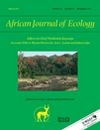
AFRICAN JOURNAL OF ECOLOGY
Fostering Insights into Biodiversity and BehaviorThe African Journal of Ecology, published by Wiley, is a leading academic journal in the field of Ecology, Evolution, Behavior, and Systematics. Established in 1963 and continuing its vital contributions to the field until 2024, this journal serves as a premier platform for researchers and scholars to share groundbreaking studies that explore the intricate relationships within ecosystems, particularly in the African context. With an impressive Scopus Rank of #423 out of 721 and a Q3 Quartile ranking, it stands as a credible source of scholarly information, gaining recognition among peers for its rigorous peer-review process and impactful publications. While the journal is not open access, it remains influential in driving advancements in ecological research and providing insights vital for conservation efforts and biodiversity studies. Authors and readers alike will find that the African Journal of Ecology not only promotes scientific inquiry but also fosters a deeper understanding of ecological dynamics that affect our world.
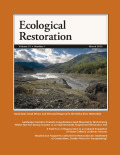
Ecological Restoration
Cultivating knowledge for a greener tomorrow.Ecological Restoration is a renowned journal published by University of Wisconsin Press, focusing on the critical and evolving field of ecological restoration. With its inception dating back to 1999 and converging through the years to 2024, the journal has carved out a significant niche, reflected in its recognition within the Q3 category of Nature and Landscape Conservation for 2023. Although the journal is not readily available as open access, it offers an essential platform for researchers, professionals, and students to publish their findings and collaborate across diverse topics relevant to environmental science and restoration practices. Ranked #123 out of 211 in its Scopus category and positioned in the 41st percentile, Ecological Restoration is dedicated to advancing the dialogue surrounding restoration techniques, ecological health, and sustainability efforts in response to ongoing global environmental challenges. This makes it a vital resource for anyone committed to enhancing the integrity of our natural ecosystems.
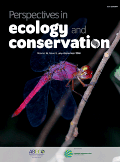
Perspectives in Ecology and Conservation
Elevating the discourse on ecology and sustainable practices.Perspectives in Ecology and Conservation, published by Elsevier Science Ltd, is a leading academic journal dedicated to advancing the fields of ecology, conservation, and environmental management. With a Q1 ranking in multiple categories, including Ecology, Management, Monitoring, Policy and Law, and Nature and Landscape Conservation, this journal boasts an impressive standing among its peers, making it essential reading for researchers and professionals. Since its inception in 2017 and running through 2024, it aims to provide innovative perspectives and critical analyses that enhance our understanding and practices in conservation science. The journal is accessible through open access options, facilitating broader dissemination of knowledge. Its commitment to addressing contemporary ecological challenges reinforces its importance in the academic community, promoting sustainable practices and informed policy-making in the face of urgent environmental issues.

Journal of Fish and Wildlife Management
Navigating the future of fish and wildlife conservation.The Journal of Fish and Wildlife Management, published by the U.S. Fish & Wildlife Service, serves as a vital resource for scholars, researchers, and professionals in the fields of Animal Science, Ecology, and Conservation Biology. With its ISSN 1944-687X, this esteemed journal has been disseminating critical research findings since 2010, contributing significantly to the understanding of fish and wildlife conservation practices and their ecological impacts. Despite its Q3 category rankings in various disciplines as of 2023, it provides a platform for innovative research that influences policy and management strategies for biodiversity conservation. The journal, although not open access, remains committed to advancing the scientific discourse surrounding wildlife management with articles that emphasize practical conservation efforts and ecological sustainability. Readers can expect a diverse range of articles that promote best practices in the management and conservation of fish and wildlife resources, furthering our collective mission of preserving ecological health and biodiversity for future generations.
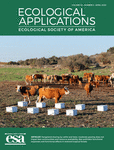
ECOLOGICAL APPLICATIONS
Pioneering research for the preservation of our planet.ECOLOGICAL APPLICATIONS, published by WILEY, is a leading journal in the field of ecology, providing a platform for innovative research that addresses the understanding and management of ecological systems. With an ISSN of 1051-0761 and E-ISSN of 1939-5582, it has established itself as a vital resource for ecologists and environmental scientists since its inception in 1991. Ranked in the top quartile (Q1) for Ecology in 2023 and with a Scopus ranking of 40 out of 461 in Environmental Science, ECOLOGICAL APPLICATIONS boasts an impressive impact factor, attesting to its significance and influence in the field. The journal's mission is to publish peer-reviewed articles that contribute to ecological theory and its applications in conservation and environmental management. Researchers, professionals, and students alike will find invaluable insights and the latest developments in ecological research through its comprehensive scope and rigorous scholarship, ensuring a crucial role in shaping future ecological practices and policies.
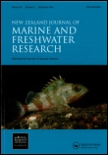
NEW ZEALAND JOURNAL OF MARINE AND FRESHWATER RESEARCH
Unveiling the Secrets of New Zealand's WatersNEW ZEALAND JOURNAL OF MARINE AND FRESHWATER RESEARCH, published by Taylor & Francis Ltd, stands as a distinguished platform for the dissemination of innovative research in the realms of aquatic science and ecology. With an ISSN of 0028-8330 and E-ISSN 1175-8805, this journal has been curating significant scientific contributions since its inception in 1967, continuing through to 2024. Recognized in the Q2 category across multiple relevant fields—including Aquatic Science, Ecology, and Water Science—this journal ranks notably in Scopus, with a 74th percentile for Ecology, Evolution, Behavior and Systematics, highlighting its impact and relevance within the scientific community. Though not an open-access publication, its rigorous peer-reviewed articles offer insights that resonate with researchers, professionals, and students who are passionate about advancing our understanding of freshwater and marine ecosystems. By fostering a collaborative space for ecological and environmental inquiries, the NEW ZEALAND JOURNAL OF MARINE AND FRESHWATER RESEARCH is essential for those aiming to contribute to the vital conversations around biodiversity, conservation, and sustainable management of aquatic resources.

Inland Waters
Exploring the Depths of Freshwater EcosystemsInland Waters, published by TAYLOR & FRANCIS LTD, stands as a prestigious scholarly journal dedicated to the critical examination of freshwater ecosystems and their management. With an ISSN of 2044-2041 and an E-ISSN of 2044-205X, this journal boasts a remarkable Q1 ranking in both Aquatic Science and Water Science and Technology for 2023, reflecting its significant impact in the field. Researchers and professionals can benefit from its comprehensive coverage of cutting-edge research, methodological advancements, and policy implications concerning inland waters. Committed to disseminating valuable knowledge in a vital area of environmental science, Inland Waters aims to foster collaboration and promote innovative solutions for sustainable water management practices. As it continues through its converged years from 2012 to 2024, the journal remains an essential resource for those dedicated to advancing our understanding and stewardship of freshwater environments worldwide.
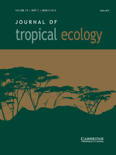
JOURNAL OF TROPICAL ECOLOGY
Exploring the Rich Tapestry of Tropical EcosystemsThe JOURNAL OF TROPICAL ECOLOGY, published by Cambridge University Press, serves as a pivotal platform for advancing knowledge in the field of ecology, particularly within tropical environments. With an ISSN of 0266-4674 and an E-ISSN of 1469-7831, this esteemed journal has been a key resource since its inception in 1985, maintaining a focus on empirical research that addresses the complexities of tropical ecosystems. It holds a respectable Q3 ranking in the Ecology, Evolution, Behavior and Systematics category as of 2023, indicating its significant contribution to the field, although it remains within the competitive mid-range. The journal publishes original research, reviews, and methodological articles that illuminate the rich biodiversity and unique ecological processes of tropical regions, fostering a deeper understanding of conservation challenges. Accessible from the United Kingdom, this publication appeals to a diverse audience of researchers, professionals, and students keen on exploring ecological dynamics in tropical settings, and plays a crucial role in promoting scientific discourse and collaborative efforts aimed at preserving our planet's vital ecosystems.

LAKE AND RESERVOIR MANAGEMENT
Fostering interdisciplinary collaboration for better water management.LAKE AND RESERVOIR MANAGEMENT is a premier academic journal published by Taylor & Francis Inc, providing a dedicated platform for the dissemination of high-quality research and innovations in the field of aquatic management. With an ISSN of 1040-2381 and an E-ISSN of 2151-5530, the journal encompasses a broad spectrum of topics related to the sustainable management and ecological assessment of lakes and reservoirs. As an essential resource for researchers, professionals, and students involved in environmental science, hydrology, and water resource management, the journal aims to address critical issues such as water quality, ecosystem services, and the impact of human activities on aquatic systems. Additionally, the journal promotes interdisciplinary approaches that foster collaborative solutions for effective management of aquatic resources. Although it currently does not offer open access, LAKE AND RESERVOIR MANAGEMENT remains influential in shaping policies and practices within the field, making it a vital read for anyone dedicated to advancing knowledge and practice in aquatic ecosystem management.

NEW ZEALAND JOURNAL OF ECOLOGY
Exploring New Zealand's Ecological FrontiersNEW ZEALAND JOURNAL OF ECOLOGY, published by the New Zealand Ecological Society, stands as a premier platform for disseminating research in the field of ecology, with a notable impact factor reflected in its Q2 ranking in multiple ecology categories for 2023. Established in 1980 and actively publishing since 1982, this journal provides a vital resource for ecologists and environmental scientists, fostering the exchange of innovative ideas and methodologies. The journal covers a wide range of ecological topics, ensuring a comprehensive overview of the current trends and research developments in both ecological theory and practical applications specific to New Zealand and beyond. Researchers, professionals, and students will find in this journal an authoritative source to advance their understanding of ecological dynamics and contribute to the growing field of ecological science. The journal is accessible to the community without open access, providing critical insights that underpin the ecological landscape of New Zealand and inform sustainable practices worldwide.